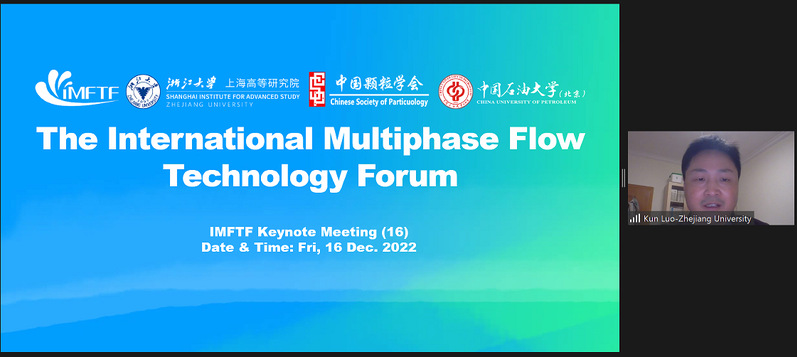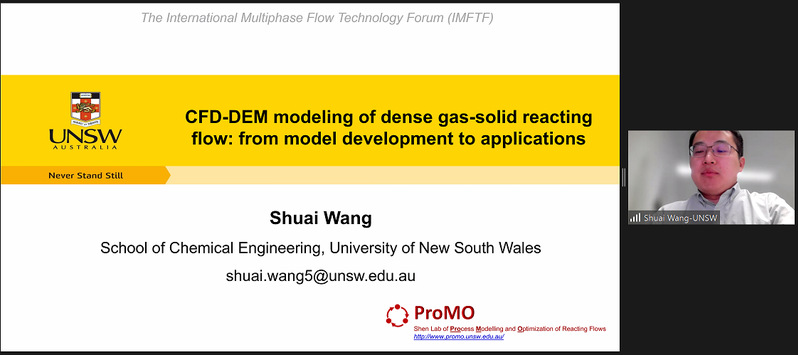Shanghai Institute for Advanced Study, Zhejiang University, China Society of Particuology and China University of Petroleum-Beijing joint efforts to host the International Multiphase Flow Technology Forum (IMFTF) 16th Keynote session. Professor Luo Kun, Deputy Director of Shanghai Institute for Advanced Study, Zhejiang University, hosted the forum.

Professor Luo opened the forum at 19:00 Beijing time on 16th December, 2022, and introduced two speakers on behalf of the organizers. The keynote speakers are Dr Mikio Sakai from Resilience Engineering Research Center, the University of Tokyo, Japan and Dr Shuai Wang, post-doctoral fellow at University of New South Wales, Australia. Both speakers presented their work on core technologies for realization of the DEM based cyber-physical system, and CFD-DEM modeling of dense gas-solid reacting flow respectively, and shared their experiences with the audiences. The talks were well-received, there were heated discussions at Q&A session.

Dr Sakai’s presentation is entitled ‘Core technologies for realization of the DEM based cyber-physical system’. The fourth industrial revolution has just taken place due to the recently significant development of internet and communication technology. This revolution would drastically change manufacturing because of the cyber-physical system (CPS), and the role of modeling and simulation would become more important for constructing the CPS. CPS requires real-time computation, high-accuracy modeling, and synchronization between cyber and physical spaces. Besides, big data obtained from the calculations would be applied, e.g., developing a surrogate model and elucidating the phenomena. This trend would be the same as that of the powder industries. The CPS of the powder process would adopt the discrete element method extensively. From the background, Dr Sakai’s group has developed core technologies for the CPS from modeling and data science viewpoints. He demonstrated the latest achievements of his group in this presentation. Those work were supported by JSPS KAKENHI.

Dr Wang brought the audience the presentation ‘CFD-DEM modeling of dense gas-solid reacting flow: from model development to applications’. Dense gas-solid reacting flow involves complex multiphase flow, heat and mass transfer, and chemical reactions. Computational fluid dynamics-discrete element method (CFD-DEM) simulation has become a promising method to understand and optimize the dense gas-solid reacting systems. Despite its recent advancement and successful applications to a variety of chemical engineering processes, a comprehensive introduction of the theory and applications that underpin the CFD-DEM modelling of dense gas-solid reacting flow has not yet been conducted. In this talk, Dr Wang listed the recent progress in the development of CFD-DEM models and their applications to dense gas-solid reacting systems. The sub-models for describing the flow dynamics and thermochemical conversion were firstly presented in terms of numerical algorithms and corresponding implementations from flow to heat and mass transfer and speed-up methods. Then, recent advancements of CFD-DEM applications in dense gas-solid reacting systems were given, with a focus on chemical engineering processes, e.g., biomass gasification, char combustion, blast furnace ironmaking, and PV pyrolysis.
The forum was broadcasted live via China Society of Particuology with more than 45,000 audiences.

